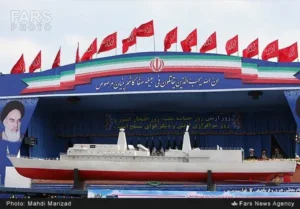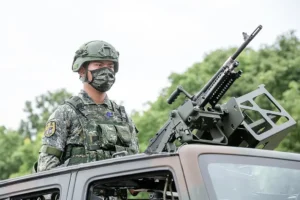Embarking on an Antarctic expedition, Milei’s itinerary included visits to both the Marambio and Esperanza bases.

Argentine President Javier Milei embarked on his inaugural official trip to Antarctica, visiting the Marambio and Esperanza bases as part of a collaboration program with the International Atomic Energy Agency (IAEA) targeting the study of marine plastic pollution. This significant move aims to usher Argentina into a new era in Antarctic scientific endeavors, as affirmed by the President during his visit.
The visit occurs amid a difficult political situation in Argentina, where the reforms proposed by Milei are facing increasing difficulties.
Accompanied by a delegation including Foreign Minister Diana Mondino, Defense Minister Luis Petri, Interior Minister Guillermo Francos, Secretary General of the Presidency Karina Milei, and IAEA Director General Rafael Grossi, President Milei arrived at the Marambio base aboard a Hercules C-130 around noon.
Notably absent were representatives from the now-dissolved Ministry of Environment, their responsibilities absorbed by other portfolios. After a warm reception by station head Vice Commodore Damián Ariel Rizzo, the President toured base facilities and engaged with scientific and operational personnel, commencing collaboration activities between Argentina and the IAEA.
This partnership, orchestrated by the Argentine Antarctic Program under the National Antarctic Directorate (DNA) within the Foreign Ministry’s purview, aligns with the Antarctic Treaty System. President Milei emphasized, “Argentina will begin a new chapter in its long and distinguished history in Antarctic science. Through international cooperation agreements, we seek to enhance our capabilities to provide quality scientific information for decision-making within the framework of the Antarctic Treaty.”
Central to this initiative is the Nutec Plastics project, utilizing nuclear technology to study and control marine plastic pollution worldwide, now extended to include Antarctica. The program involves deploying two research teams for durations of 60 and 120 days, backed by logistical support from the Ministry of Defense’s Antarctic Command. Analysis of collected samples will be conducted by the Antarctic Institute, aided by the IAEA’s provision of supplies, laboratory equipment, and funding for training.
President Milei stressed, “The pursuit of science, cooperation, and preservation of the Antarctic environment form the core pillars of our Antarctic foreign policy.” He reiterated his stance that climate change remains unaffected by human activities, previously stating, “Policies blaming humans for climate change seek to raise funds to finance lazy socialists who write second-rate papers.”
Subsequently, Milei departed via helicopter for Esperanza, Antarctica’s most inhabited Argentine station, housing families and the continent’s sole school, Provincial School No. 38. The President later returned to Marambio, officially launching the IAEA’s First Scientific Research Expedition in Antarctica before concluding his visit and departing for Rio Gallegos.







